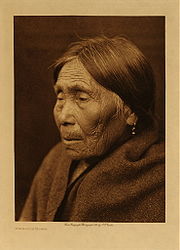Chimakum people

A Chimakum woman,
photographed by Edward S. Curtis |
|
| Total population | |
|---|---|
| unknown | |
| Regions with significant populations | |
| United States (Washington) | |
| Languages | |
| English, formerly Chemakum | |
| Related ethnic groups | |
| Quileute |
The Chimakum, also spelled Chemakum and Chimacum are a near extinct Native American people (known to themselves as Aqokúlo and sometimes called the Port Townsend Indians), who lived in the northeastern portion of the Olympic Peninsula in Washington State, between Hood Canal and Discovery Bay until their virtual extinction in 1902. Their primary settlements were on Port Townsend Bay, on the Quimper Peninsula, and Port Ludlow Bay to the south.
Today Chimakum people are enrolled in three federally recognized tribes, the Skokomish, Jamestown, and Port Gamble S'Klallam tribes, although lineage is not traceable at present.
The Chimakum population was estimated at 400 in 1780 and 90 in 1855. The Census of 1910 enumerated just three, according to the census of Franz Boas.. The three remaining tribe members spoke only broken Chimakum language. In the present day there are people who identify as Chimakums or descendants of Chimakums.
The Chemakum language was one of two Chimakuan languages and very similar to the Quileute language. It is now extinct. It was spoken until the 1940s on the east side of the Olympic Peninsula between Port Townsend and Hood Canal. The name Chimakum (or Chemakum) is an Anglicized version of a Salishan word for the Chimakum people, such as the Twana word čə́bqəb [t͡ʃə́bqəb] (earlier [t͡ʃə́mqəm]).
In 1890 anthropologist Franz Boas found only three speakers of the Chemakum language, and they spoke it imperfectly. The Census of 1910 reflects only 3 speakers of broken Chemakum dialect.
...
Wikipedia
